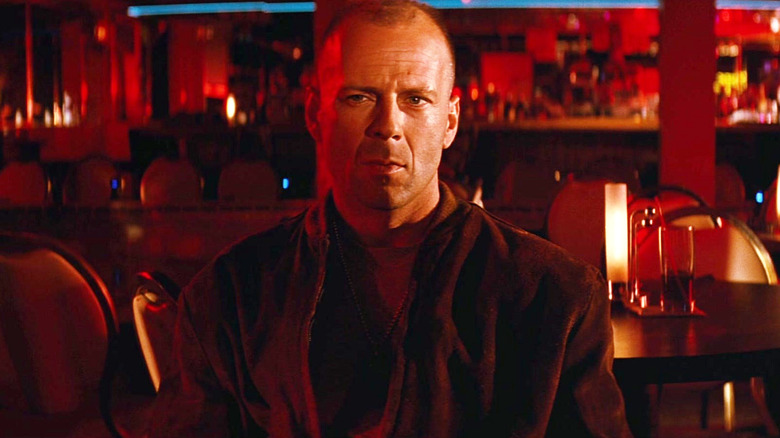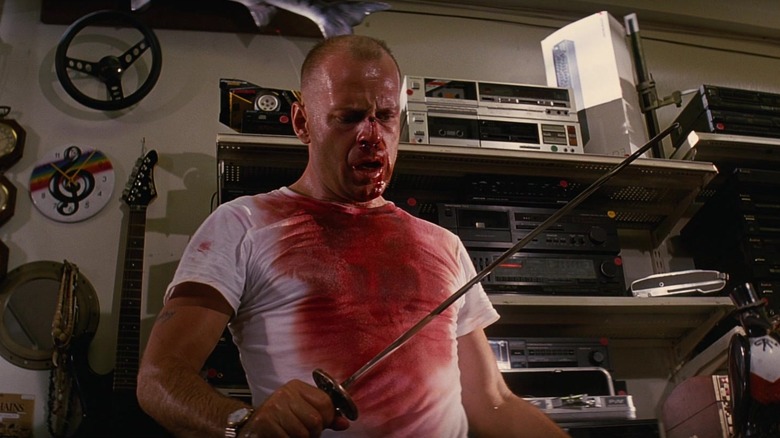Bruce Willis Made Pulp Fiction Profitable Before A Single Frame Was Filmed
When we talk about the cast of "Pulp Fiction," we rarely seem to mention the name Bruce Willis. We discuss the resurrection of John Travolta's career, the superstar explosion of Samuel L. Jackson, the complete shift of how we saw former ingénue Uma Thurman, the hilarious monologue by Christopher Walken, and the bizarre energy of Quentin Tarantino himself as Jimmy. Meanwhile, Willis is almost seen as an afterthought.
Most of the discussion surrounding the story of Willis' Butch is about what happens in that story. You have Zed, the gimp, the pawn shop weapon selection, and the surprise death of Travolta's Vincent Vega. It's the section of "Pulp Fiction" that ramps up the violence and the extremity, but in a way, it also feels the most disconnected from the rest of the film. I find this pushing aside of what Willis is bringing to Tarantino's sophomore feature to be somewhat of a shame because, in some ways, the performance he is giving is most indicative of the "pulp" of the film's title, drawing on tried-and-true genre tropes and maneuvering through that extremity in a way that keeps the film planted firmly on the ground.
"Pulp Fiction" may have made and redefined movie stars, but going into that film, Bruce Willis was the only undeniable A-lister in its cast, commanding big paydays the movie couldn't afford. That was no issue, as he had total belief in the script and Tarantino, saying in the book "Pulp Fiction: The Complete Story of Quentin Tarantino's Masterpiece" by Jason Bailey, "I said whatever you want me to do, I'll do. I didn't flex. How much I was paid wasn't a consideration." His involvement was for artistic reasons, but it provided a major financial boost as well. And it's not because of box office receipts.
The impact of international sales
"Pulp Fiction" had a budget of $8.5 million. That was not a very large budget for a feature film as ambitious as this. I mean, Bruce Willis alone could command that amount of money for himself on a major Hollywood picture at that time, if not more. However, it was a massive hike in price compared to Quentin Tarantino's debut feature "Reservoir Dogs," which cost about $1.5 million to make.
Before production even started on the film, no one knew it would become the cultural phenomenon it did, making over $200 million worldwide. This was a supremely violent and incredibly talky picture told in a non-linear fashion primarily starring a has-been in Travolta. There was no guarantee of its success. Then Bruce Willis signed on. As recalled in Bailey's book, Willis' star power was such that it had international companies vying for the international distribution rights to the picture, and Miramax was able to secure an $11 million deal for them based almost entirely on his name alone. Being able to make that kind of deal before anything has been shot is extremely encouraging for business.
Of course, to say the movie was instantly profitable is a bit wrong. That production budget doesn't take into account marketing costs, festival costs, and the striking and shipping of film prints. What those sales did was give Miramax a certain infrastructure with which to do all of these things to best set it up to reach a wide audience. While the film had extraordinary reviews and word of mouth, I don't doubt that Willis' presence also contributed a great deal to the box office as well. "Pulp Fiction" became one of the great financial success stories of the 1990s, due in no small part to the now-retired actor.

